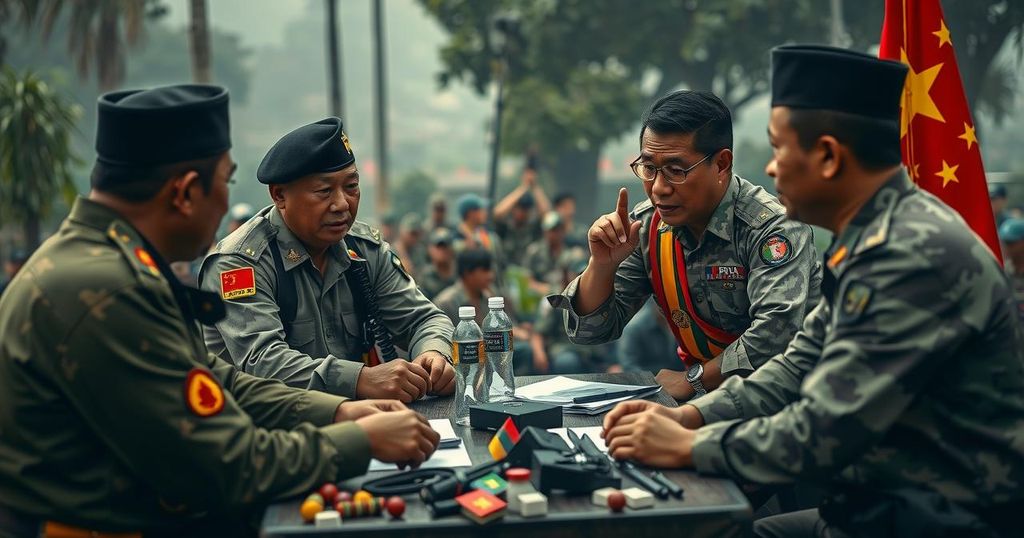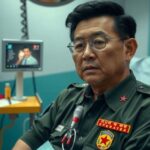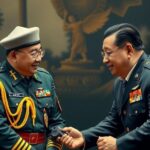Conflicts
Politics
ASIA, BEIJING, CHINA, CIVIL WAR, CONFLICT RESOLUTION, INTERNATIONAL RELATIONS, JUNTA, KY, KYAW ZAW, LWAY YAY OO, MEXICO, MILITARY, MYANMAR, MYANMAR NATIONAL DEMOCRATIC ALLIANCE ARMY, NATIONAL UNITY GOVERNMENT, NORTH AMERICA, SHAN, SHO, SHOON NA, TA ' ANG NATIONAL LIBERATION ARMY, THOMSON REUTERS, TNLA, YANGON
Clara Montgomery
TNLA Signals Openness to Dialogue with Myanmar Junta Amid Ongoing Conflict
The Ta’ang National Liberation Army (TNLA) has expressed a willingness to engage in dialogue with Myanmar’s military junta, amid ongoing conflict and humanitarian issues exacerbated by military airstrikes. This decision follows a year of hostilities along the Myanmar-China border and aligns with pressure from China to mediate the situation. The TNLA’s acknowledgment of civilian suffering and desire for peace reflects a potential turning point in the conflict.
A significant development has emerged in Myanmar’s ongoing conflict, with the Ta’ang National Liberation Army (TNLA) expressing its readiness to engage in dialogue with the ruling military junta. This decision comes on the heels of a year-long struggle against the military forces, predominantly along the Myanmar-China border. The TNLA’s willingness to negotiate coincides with increased pressure from China, which has historically viewed the military as a stabilizing force in the region.
The TNLA made their intentions public through a statement on their Telegram channel, urging for an end to the military’s airstrikes in northern Shan state, where they have been causing civilian suffering. Lway Yay Oo, a spokesperson for the TNLA, articulated the sentiment within the organization, stating, “Our civilians are suffering from air strikes and other difficulties. So, we need to find a way out.” This need for dialogue appears to challenge the violent trajectory of the conflict, which has escalated since the military coup that ousted the democratically elected government in 2021.
The conflict escalated following the military coup, evolving from peaceful protests to armed resistance movements, prompting the TNLA to participate in a unified offensive known as “Operation 1027.” This operation marks a critical challenge to military control, securing the loss of several military posts and towns. Although a ceasefire was previously brokered in January through Chinese mediation, it ultimately disintegrated by June, leading to renewed hostilities.
The junta’s response remains elusive as they have not commented on the TNLA’s recent announcement. Additionally, the Chinese embassy in Yangon has not yet issued a response. In light of the situation, Myanmar’s parallel governing body, the National Unity Government (NUG), has urged China to act with the consideration of the people’s will, emphasizing their stance by stating, “I want to encourage China not to conduct meetings which go against the will of Myanmar’s people as they will not be helpful to the country’s peace,” as conveyed by their spokesperson, Kyaw Zaw.
The context of this situation lies in the complex political landscape of Myanmar following the military coup in February 2021, which ousted a democratically elected government led by Aung San Suu Kyi. The coup triggered widespread unrest, giving rise to a multifaceted resistance movement, including armed factions like the TNLA. The country has since witnessed a deterioration of social and military stability, prompting various ethnic armed groups to join forces against the junta. China’s involvement is significant, as it has long-standing interests in Myanmar’s stability and has acted as a mediator in past conflicts. The TNLA’s recent shift towards dialogue indicates a possible shift in the conflict’s dynamics.
In summary, the TNLA’s readiness to negotiate with Myanmar’s military marks a pivotal moment in an entrenched conflict, highlighting the complexities brought about by external influences such as China. The expressed need for dialogue amid ongoing hostilities reflects the dire humanitarian conditions faced by civilians in the impacted regions. As the situation unfolds, the responses from the junta, China, and Myanmar’s opposition will be essential in shaping future peace efforts in the region.
Original Source: www.usnews.com








Post Comment